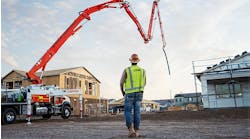The suicide bombings against London's public transit network this summer served as a stark reminder that the war against terrorism is far from over. And though our own nation's far more catastrophic experience is now four years behind us, the attacks against London's subway and buses show we must keep our guard up.
The trucking industry must determine whether it is truly ready. Do fleets have good security procedures in place to thwart or at least minimize the terrorist threat?
Palm Beach County, FL, feels that it is on the right track. “Palm Beach International Airport is part of the county operation and our trucks need access to the facility,” says Doug Weichman, director of the county's fleet management division. “Our service, fuel and lube truck operators have to go through a 10-year background check, which was previously five years, and they must receive proper badges and clearance per TSA and FAA rules” before they can operate vehicles at the airport.
“Access is much tighter since 9/11. All personnel must now go through an annual four-hour security training class, which previously was just a one-hour class every two years,” Weichman adds. “[Personal] driver licenses and background checks by the FDLE [Florida Dept. of Law Enforcement] are now done prior to employment; in the past they were checked in the first 90 days of employment — and sometimes longer, if at all.”
Security efforts don't stop once people are hired. “Employees are issued county ID's and sign-in logs are required at our facility,” he explains.
“In the future, I see access to our facilities getting much tighter, with more surveillance and monitoring of our vehicles and people accessing them. I think our fuel sites will also be designed with more security in mind.”
According to Weichman, “[It's] a lot easier to shoot at an above-ground tank than in-ground. Since the newer in-ground tanks are just as environmentally friendly as the above-ground type, the fleet may go back to burying fuel storage tanks in the ground.”
Some experts believe that even though some individual fleets are making big strides, the trucking sector as a whole needs to redouble its security efforts. Terry Evans, CEO and president of Fleet Defender Consulting Services, says trucking and government still haven't faced the threat of terrorism head-on. “The Highway Watch Program is a great first step, but it is not nearly enough,” he says. “[Security] is not a 100-yard dash — it's a 10-mile marathon. I can't speak highly enough about the dedicated professionals employed with the Highway Watch Program. But our back door has been left wide open.”
Evans suggests driver screening as an example, where fake documents and bogus employment histories can still be easily secured. “We still don't even require basic security such as fingerprinting CDL licensed drivers,” Evans said.
He also points to driver carelessness. “Go to any truck stop today and you will still find trucks sitting empty, unlocked and idling, while the driver sits inside having a meal.”
Evans says behavior like this must be changed because the impact of a terrorist attack using trucks would be catastrophic to the national economy. “Given that trucks are the number-one tool used by terrorists worldwide, and given that we have not adequately protected ourselves, it isn't a quantum leap to conclude that the trucking industry and the nation are in trouble.”
Good points all — and things the industry should think about as the threat of terrorism continues to hang over us.


